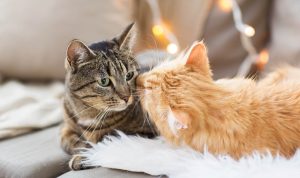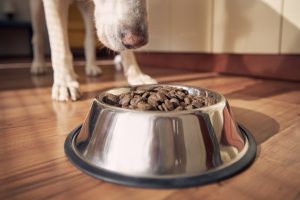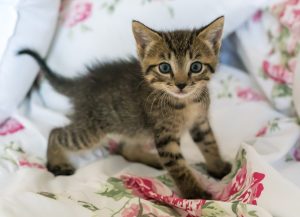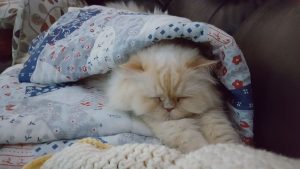Did you know that a cat licking its fur could be a sign of stress? Well, in this article, you will learn everything about cat stress and how to reduce it as well as prevent Alopecia (hair loss). Under the influence of stress or after a certain unpleasant experience, the cat does not clean its hair normally but licks it more often and more intensely. Such stress-related disorders are more common in Eastern cats but can affect any cat. Heredity and the environment play an important role in cat behaviour. It is believed that cats suffer from stress much more than dogs because they are more accustomed to human housing, so they have not yet come to terms with such cohabitation. For example, many people do not understand that a cat is reluctant to share its territory with another animal, even if it is another cat. If you take another pet, you should allow the cat to get to know each other for a while. Let’s go into further details about all these interesting facts!
How a Cat Takes Care of Its Fur?
Cats usually spend 10 to 30% of their waking time licking their hair. It is essential for cats and has several benefits.
- Licking feathers is thought to promote the release of well-being hormones that relax the cat – a washing ritual helps it calm down.
- When licking their feathers, cats instinctively want to get rid of the food or other odours so that a potentially dangerous animal does not smell them.
- Cats have a slight sweat on their paws, but in most cases, saliva, which evaporates from the cat’s fur, ensures an average body temperature.
- Licking and feather cleaning help to evenly coat the coat with grease that protects it.
- Cat saliva is thought to contain enzymes and can therefore be considered a natural antibiotic that can protect cats from various infections.
- Licking your hair can stimulate blood circulation.
- Cats also lick each other’s feathers, showing their sympathy.
What Happens When Your Cat Cleans Itself Way Too Much?
If a cat licks its feathers more, it will fall out due to this action, although it can be seen that the skin under the feathers is healthy. Most often, cats do not lick themselves in the owner’s presence because then they feel calm. However, if your cat does this, you will definitely notice places where the hair has fallen out, and possibly even scabs and sores have formed.
And What a Perfect Coat Should Look Like?
A healthy cat fur should meet the following:
- It should shine, and the hair should be soft and smooth.
- The coat should not have much dandruff.
- The feather must be clean, free of black spots that could indicate fleas.
- The coat should not have spots that expose the skin and have lost its hair.
- The feather should fall off evenly and gradually; then, the cat will not try to clean it by licking hard.
For a cat to have such fur, it must be given a quality diet that contains all the necessary nutrients and essential amino acids. Once a year, the cat should be taken to a veterinarian to pay attention to possible health problems in good time, and some time should be spent regularly combing the cat’s hair.
So, How to Help Your Furry Babies?
Other possible causes of skin diseases, such as food allergies, fleas, pollen or dust mites, should be ruled out first. Another cat may lick its hair more heavily if it has osteoarthritis, which causes pain, cystitis, constipation, hyperthyroidism (increased thyroid gland activity), back pain and anal dysfunction. A variety of conditions can stress a cat, and unfortunately, stress tends to build up. Fewer stressors, such as moving house, moving a cat’s litter box, the absence of a resident, the appearance of a new cat in the neighbourhood, can all build up and cause a lot of stress together. Cats like routine, so even a disrupted meal regime can make them nervous. You need to provide food and drink, but you also have to play with your cat, hide some treats at home in different places so that he can look for them. Each cat should have its own sandbox placed in a more remote corner, not in front of a window, as the cat needs his private area. Provide a place where the cat can rest and be alone, but if you want, don’t pity the cat’s caresses. If you have a cat, you should be aware that your stress can also stick to your cat – your personal worries can make it even more restless. So, try to be calm and play with the cat. Playing is a great way to reduce cat stress and boredom.
Home remedies and acupuncture help reduce stress in the cat well – usually, one session a week for four to six weeks is enough. If necessary, the acupuncture procedure can be repeated once a month. It is also worth supplementing the cat’s diet with food supplements containing both L-tryptophan and valerian. L-tryptophan is an essential amino acid that is converted to serotonin in the body and reduces stress. At the same time, valerian is widely used to reduce stress levels, and cats love it.





